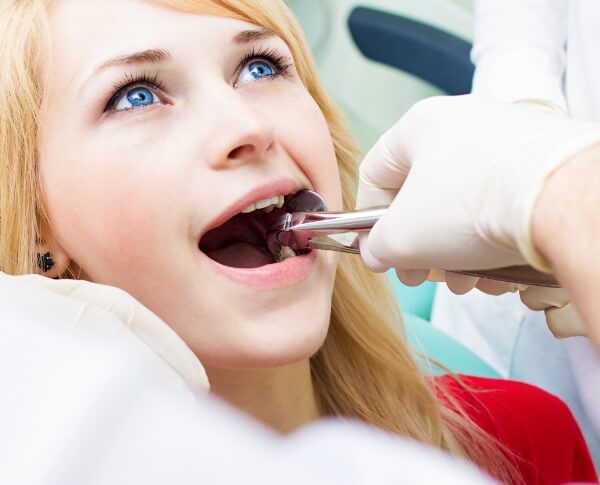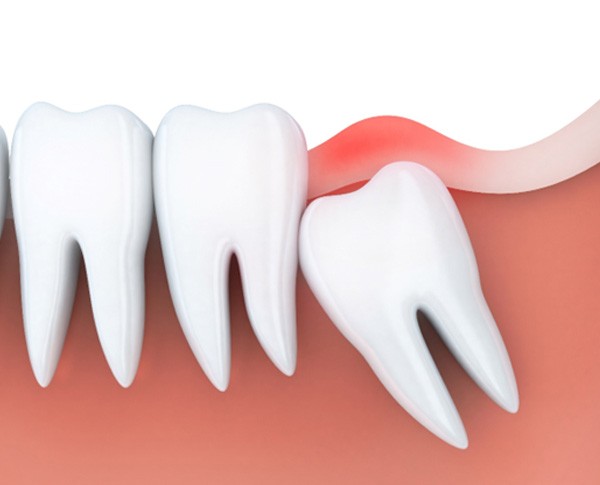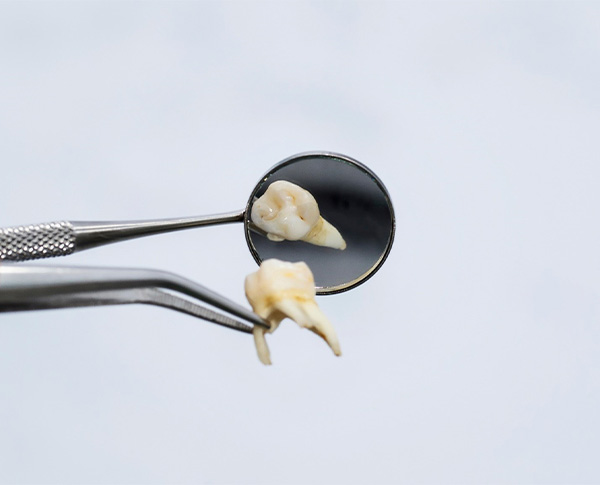Wisdom Tooth Extractions – Coppell, TX
Removing Your Loved Ones’ Impacted Wisdom Teeth
Do you have someone in your family that’s in their late teens or early twenties? If so, you should bring them to Steele Dental if they start to experience persistent jaw pain near the back of the mouth; it could mean that they need a wisdom tooth extraction soon. For many people, removing wisdom teeth is a necessary step in continuing to enjoy a pain-free lifestyle and a healthy smile. Call today to set up an appointment with Dr. Steele for wisdom tooth extractions in Coppell, TX.
Why Choose Steele Dental for Wisdom Tooth Extractions?
- Complimentary Evaluations and X-rays
- Very Gentle Surgeon Who Cares About Patients
- Oral Surgery Office That’s Mindful of Patient’s Time
Why Do Wisdom Teeth Need to Be Removed?
Wisdom teeth used to be important back when our ancestors were more likely to experience tooth loss early in life because of a coarse diet and poor oral hygiene. Today, though, most people do not need any additional teeth around early adulthood, which means there is not room in the smile for the wisdom teeth to develop naturally. The lack of space can lead to several potentially severe oral health problems.
What are the Signs That You Need a Wisdom Tooth Extraction?

Impacted wisdom teeth often cause the following symptoms:
- Persistent pain near the back of the mouth
- Swollen or tender gums (a sign of infection)
- Bleeding gums in the back of the mouth whenever you brush
- Earaches or headaches
- Stiffness, pain, or swelling in your jaw
- Consistent sinus issues
- Overcrowded or crooked teeth
- Cysts (sacs of fluid) near the area where the wisdom teeth are impacted
- Frequent cavities or oral infections
- Bad breath that doesn’t go away
- Having trouble eating (as foods might get stuck at the back of your mouth)
- Pain in your tongue or cheek
All these symptoms can have multiple causes; it’s important to have an examination performed in a timely manner so that you can determine whether they’re truly linked to impacted wisdom teeth.
Wisdom Tooth Extraction Aftercare

Slight bleeding or oozing may occur after the surgery. You can stop excessive bleeding by biting firmly on a gauze bad for 30 minutes. Take prescribed or over the counter pain medication as directed. Apply ice if there is any swelling. Drink plenty of liquids and eat soft foods high in protein; make sure that you don’t skip any meals, as you’ll feel better if you’re eating regularly. Be gentle when brushing around the surgery site.
Understanding the Cost of Wisdom Tooth Extractions

Has your dentist recommended that you get your wisdom teeth pulled? While this may not be something you’re ecstatic about, the procedure may be necessary for securing the health and future of the rest of your pearly whites. Every patient is different, so the cost of wisdom tooth extractions in Coppell will vary from case to case. The only way to receive an accurate estimate of the price is by visiting us for an initial consultation. Until then, here are some of the factors that can impact the cost of your treatment and your financing options to help make it affordable.
Factors That Can Affect Wisdom Tooth Extraction Cost

You’ll first want to schedule an appointment with your oral surgeon so they can determine if a wisdom tooth extraction is necessary or not. Our team will perform a thorough examination of your situation and provide you with a more precise estimate of the price of your procedure. Several factors can influence the cost of your extractions, including:
- Number of wisdom teeth needing extraction – The cost of your procedure will depend on how many teeth you need to be pulled. Of course, the higher the number, the bigger the upfront price.
- The type pf removal procedure – Your wisdom teeth can be removed in two ways: a simple extraction or a surgical one. This will depend on the angle or position of your tooth. A minor oral surgery will cost more than a simple removal process.
- Type of sedation dentistry used – If your teeth appear too short or stubby, it may be due to excess gum tissue. With this procedure, we can safely and reliably alter your gum line to help reveal the beautiful pearly whites underneath. The results will be permanent, but they won’t change the shade, size, or shape of your teeth.
- Veneers – Our team will likely provide you with sedation dentistry to keep you comfortable and relaxed during your appointment. Using a strong form of sedation will cost more than administering a milder method.
Does Dental Insurance Cover Wisdom Tooth Extractions?

Wisdom tooth extractions are considered essential procedures, so you’ll be glad to know that most dental insurance providers offer coverage for the treatment. In most plans, the amount covered may be about 50%. The exact percentage may vary based on your deductible and how much of your annual maximum is left. You should also remember that your insurance policy may have a waiting period, meaning you should double-check the details of your plan with your provider before committing to any procedures. Feel free to consult our knowledgeable team, as we’ll be more than happy to help simplify the process and make the most of your benefits!
How to Make Wisdom Tooth Extractions Affordable

Even if you don’t currently have dental insurance, it doesn’t mean you’ll be left entirely on your own. Our team understands the importance of being able to afford necessary dental care without breaking the bank. That’s why we’re proud to partner with third-party financiers like Lending Club, Compassionate Finance, and CareCredit. These companies offer plans that help split up the cost of your treatments into monthly installments that come with little to no interest. This can help you save money while undergoing the necessary procedures to improve and preserve your oral health.
Wisdom Tooth Extractions FAQs

Is it about time that you get your third molars extracted? You may still have some unanswered questions about the procedure, so we’re here to help. Here are the answers to some of the most common questions we receive about wisdom tooth extractions in Coppell. If you don’t see the information that you’re looking for below, don’t hesitate to give us a call . We’d be happy to walk you through the treatment process so that you know what to expect.
Why Do We Have Wisdom Teeth?
These days, wisdom teeth seem to cause nothing but trouble, but they were actually beneficial for our distant ancestors. Early humans had a diet that relied on raw foods, like raw meat, berries, nuts, roots, and leaves. They didn’t cut up their food or cook it. Chewing on these tough food items required a broader jaw and strong molars. Because their jaws were larger, wisdom teeth rarely caused a problem. Today, with our softer diets that we cook and cut up, wisdom teeth aren’t usually necessary. Since most people’s jaws aren’t wide enough to accommodate wisdom teeth, they often cause more harm than good.
Is Wisdom Tooth Removal Painful?
The first step of a wisdom tooth extraction is always numbing your mouth with a local anesthetic. You will also most likely be sedated, which limits your body’s ability to register pain. While your procedure will be painless, you will probably experience some soreness and discomfort for a few days afterward. By closely following the aftercare guidelines of your dentist, you should feel back to normal within a week.
What’s the Best Age to Get Wisdom Teeth Removed?
There isn’t a specific age when a person must have their wisdom teeth removed, but most dental professionals will recommend extracting wisdom teeth in early adulthood. Generally, the procedure and recovery are easier when the patient is younger. As a person ages, the roots of the wisdom teeth grow longer and become more embedded in the jawbone, making the procedure more complex for older patients. If your dentist suggests that you should get your wisdom teeth removed, it’s better to do it sooner rather than later.
How Soon Can I Eat After Wisdom Teeth Removal?
It is best to wait at least an hour or two after your surgery to eat. During this time, it’s important that you keep the gauze pads in place and replace them according to your dentist’s instructions to slow down the bleeding. You should still to a liquid diet on the first day and eat soft foods for a few days after that. After four to five days, you can gradually start adding heartier foods as you feel comfortable. Most people are able to resume their normal diets within a week.
Dental Implants Oral Surgery Cosmetic Treatment Sedation Dentistry View Our Services






